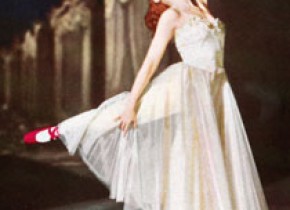Michael Powell & Emeric Pressburger
In November, the Austrian Film Museum puts its focus on what was undoubtedly the most important partnership in the history of cinema: under the name of their London-based production firm "The Archers", the English director Michael Powell and the Austro-Hungarian writer Emeric Pressburger created 13 feature films between 1942 and 1957. These films were as visionary as they were eccentric: Powell & Pressburger were uniquely equipped to blend their delight in technical and formal experimentation with spectacular entertainment.
Alongside these classic works, which include the brilliant ballet film The Red Shoes (1948) and the satirical epic The Life and Death of Colonel Blimp (1942) – "very possibly the finest film ever made in Britain", according to Dave Kehr – the Film Museum will be showing other masterpieces and rarities by Powell and Pressburger: the films the two created together for producer Alexander Korda; rarely shown short films of the "Archers"; plus the most important solo works by Michael Powell, in which the key themes of the duo's joint works are foreshadowed or completed, as in the case of the classics The Edge of the World (1937) or Peeping Tom (1960).
Powell, who was born in Kent in 1905, began his cinema career in the silent era with minor jobs for Rex Ingram and Alfred Hitchcock. In the 30's, he directed a series of "Quota Quickies" – cheap entertainment flicks which were quick to produce, before attracting the attention of producer Alexander Korda with the mystical-documentary island elegy The Edge of the World. Korda then introduced Powell to an exiled author who had formerly worked for the UFA-Studios, Emeric (Imre) Pressburger, who was three years his senior. Powell teamed up with Pressburger, who had just taught himself English, for the thriller The Spy in Black (1939).
The instant affinity the flamboyant impresario Powell and the quiet emigré Pressburger felt for each other was as unforeseen as the initially controversial results of their collaboration. Churchill, for example, tried to have Colonel Blimpbanned. Their first joint projects were all conceived as propaganda films, and promptly broke the mold for this genre: in 49th Parallel (1941), German soldiers flee through the Canadian wilderness in an attempt to reach America, which was still neutral at that time; A Canterbury Tale (1944) is a wondrous mystery play in an idyllic provincial setting. War as such hardly puts in an appearance in these "war films"; it serves more as an outset for philosophical and moral reflections.
These paradoxes exemplify the Pressburger-Powell oeuvre, in which there is always a fascination for contradictions regarding both content and aesthetics. Colonel Blimp is every bit as much a parody as it is an homage to British corps d'esprit, while Black Narcissus (1947), a hysterically full-blown/full-colour melodrama about sexually frustrated nuns in the Himalayas, was shot entirely in the studio.
Thanks to their powers of imagination, Powell and Pressburger were true cinema visionaries, even if they worked within the genre of fantasy only once, making the captivating romantic comedy A Matter of Life and Death (1946). Their films have an unconventional structure and overflow with magical ideas of an almost avant-garde nature. They are both profoundly British and cosmopolitan, they draw on classical European cultural history and at the same time anticipate postmodernism with their inimitable dry sense of humour. The unique romantic sensibility of these works culminates in the perfection of P & P’s "visual operas": technicolor wonders such as The Red Shoes, an entirely sung version of Tales of Hoffmann (1951), or their film adaptation of "Die Fledermaus", Oh Rosalinda! (1955) in which the reinvented the genre of film musicals.
The collaboration ended in 1957 the same way it had begun: amicably and with unorthodox war movies. Pressburger devoted himself to literature from that point on up until his death in 1988, and Powell's career was derailed by the scandal surrounding the serial killer fantasy Peeping Tom, which marked the final point of his lifelong reflection upon the act of seeing, and which also became one of the most influential films of modern cinema. Powell died in 1990. Both were to live to see the triumphant rediscovery of their works by a new generation of directors such as Martin Scorsese, Francis Ford Coppola and Derek Jarman (the latter being one of the few British heirs to the Powell & Pressburger tradition, alongside Nicolas Roeg and Ken Russell). Writing in 1984, Jarman stated that Michael Powell "is the only truly world-class film director England has ever produced".
